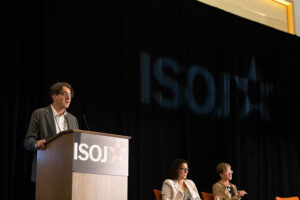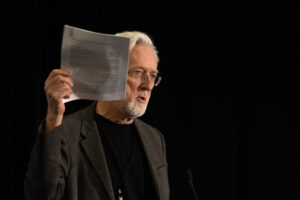Five journalism leaders gathered at the 25th International Symposium of Online Journal (ISOJ) in Austin on April 12 to discuss how government policies regarding copyright, social media regulation, and subsidies could affect the future journalism landscape. Though all the panelists emphasized the power of public policy to revitalize and protect a robust ecosystem of journalism and local news outlets, each also warned of the dangers that poorly crafted policies could present to journalists and news access.

Victor Pickard, professor and co-director of the University of Pennsylvania’s Media, Inequality & Change Center, discusses public policies and journalism at the 25th ISOJ. (Patricia Lim/Knight Center)
“Given the severity of the crisis, the speed with which it is accelerating, and the consequence for democracy in the communities, we can no longer not look at public policy as one of the solutions,” Rebuild Local News founder and president Steve Waldman said. “Yet, we also start off with a great deal of humility about how hard this is, and how we really do have to be careful. There are as many examples – if not more — of government policy in this area making things worse as there are of government policy making things better.”
Panel chair Anya Schiffrin, who serves as the director of technology, media and communications at Columbia University’s School of International and Public Affairs, began the discussion by having each of the panelists share their research on public policy affecting newsrooms and journalists across the world.
Waldman, who is also the co-founder and former president of Report for America, began by explaining the importance of public policy to address the drastic decline in revenue and coverage of local news outlets in the past two decades. However, successful policy models are within reach, according to Waldman and co-panelist Victor Pickard, who is a professor and co-director of the University of Pennsylvania’s Media, Inequality & Change Center.
“Historical and international models of journalism policy can expand our regulatory imagination of what’s possible,” Pickard said. “Given the structure of the crisis facing journalism today, policy should be evaluated as to whether it works towards transformation. Not just propping up failing commercial models.”
Government involvement will be an unavoidable and necessary part of that transformation, according to Pickard. Though panelists acknowledged the wariness that many have towards government involvement in news media, they pointed out that government involvement does not have to mean intervention in editorial independence.
As Waldman and Pickard explained, government policy can encompass a wide range of new and proven approaches that include subsidizing public media, giving vouchers to citizens who can choose which local outlets they’d like to support, and implementing more robust technology and anti-trust regulations. In one chart, Pickard showed the disparity between the U.S.’s spending on public media per person ($1.58) and other European democracies like the United Kingdom (about $100 per person).
For panelist Amy Mitchell, thorough understanding of data and research is crucial to building these productive journalism policies. Mitchell, who is the founding executive director for the Center for News, Technology & Innovation (CNTI), focuses CNTI’s work on encouraging independent, sustainable media models and fostering interdisciplinary conversations around public policy.
“There’s a lot of opportunity. There’s also a lot of potential downsides … I’d say there are six key areas to think about for this overarching question of a sustainable news system,” Mitchell said. “What kind of sustainability does this policy that I'm looking at now secure? Does it safeguard an independent, diverse and safe news media? Does it protect the public's access to a plurality of news? Does it protect against potential regime change and or global developments? How can we learn from the research that's out there? And how can we manage this and foresee potential problems?”
Mitchell acknowledged that there is no such thing as a perfect policy, but grappling with these questions are crucial to achieving balanced outcomes. Mitchell pointed to current global media policies that attempt to address fake news, which overwhelmingly had imprecise or nonexistent legal definitions and unclear enforcement authorities, but very clear, harsh punishments for the journalists who might violate them.
“We can’t sit hamstrung and do nothing,” Mitchell said. “It is important to be aware of how laws are being used in advance of [regime and global] change.”

Jeff Jarvis, director of the Tow-Knight Center for Entrepreneurial Journalism at the Craig Newmark Graduate School of Journalism, is not a fan of the California Journalism Protection Act. (Patricia Lim/Knight Center)
One policy in particular drew the panelists’ attention: the California Journalism Protection Act (CJPA). The CJPA’s stated purpose is to support news outlets by requiring hosting platforms like Google and Meta to negotiate with and pay news platforms to display the links and headlines for their articles. The policy has seen immediate resistance from big tech platforms; the day before the panel, Google announced that it would begin removing links to certain news websites for California Google users as a “short term test.” However, the policy has sparked controversy as to its efficacy and purpose even among those in the news industry.
“I have many issues with CJPA,” Jeff Jarvis, director of the Tow-Knight Center for Entrepreneurial Journalism at the Craig Newmark Graduate School of Journalism, said. “Spoiler: I can’t stand it.”
Besides CJPA threatening further incursions on fair use and copyright, Jarvis criticized lobbyists’ involvement in the law’s formation, the lack of input from actual journalists and BIPOC publishers, and the overwhelming benefits of the law going to hedge funds rather than newsrooms.
“We need reparative journalism,” Jarvis said. “We need to go back to the drawing board and ask, one, where’s the money coming from? Two, where’s the money going? Three, how is that money distributed? Finally, the question to me is this: Do we want to support news as it was or news as it should be?”
ISOJ is a global online journalism conference organized by the Knight Center for Journalism in the Americas at the University of Texas at Austin. In 2024, it is celebrating 25 years of bringing together journalists, media executives and scholars to discuss the impact of the digital revolution on journalism.